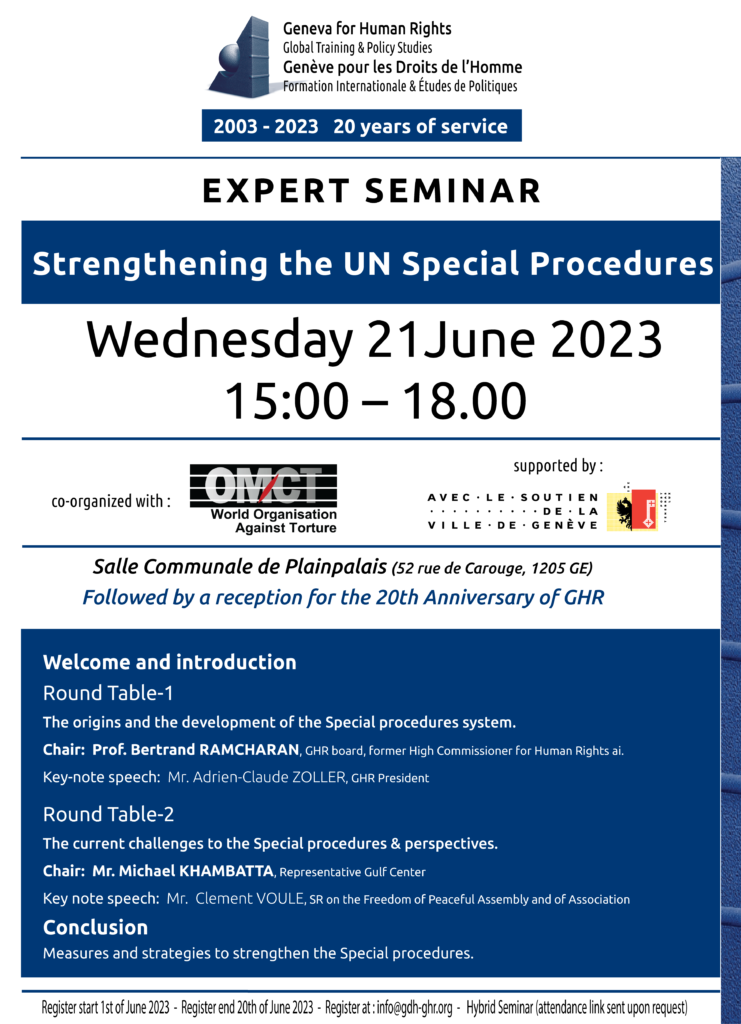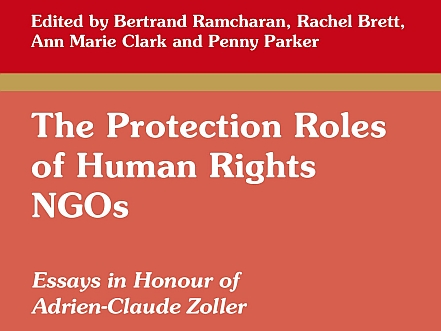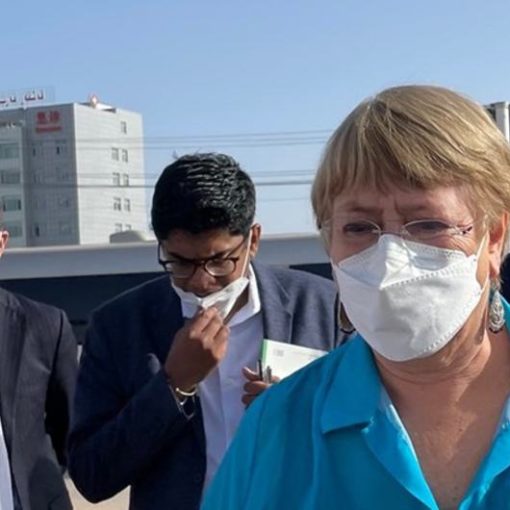Expert Seminar on the occasion of the 20th anniversary of Geneva for Human Rights
Summary
To mark its 20th Anniversary, Geneva for Human Rights (GHR) convenes its 41st Expert Seminar on Wednesday 21 June 2023, from 15:00 to 18:00, in the Salle Communale de Plainpalais, Geneva. Theme of the Seminar will be the strengthening of the UN Special country and thematic procedures.
Gradually set-up since the end of the 70s by the UN Commission on Human Rights, and by the UN Human Rights Council, these procedures constitute an essential source of information and proposals for the UN human rights bodies. The Seminar shall review the origins, the evolution and the effectiveness of this unique system, which faces a series of challenges, and examine the best ways to strengthen these procedures, to ensure that the international human rights system is relevant, accessible, responsive and effective for defenders and victims. The event is co-sponsored by the City of Geneva and by the World Organisation Against Torture (OMCT),
Geneva for Human Rights
We are a unique training organisation in International Geneva. Over the last 20 years, we trained more than 2’000 defenders and NGOs in the use of regional and international human rights procedures, empowering them to fully participate in the processes of human rights implementation on the spot.
With our Global Training Programme, we conducted fifty-three (2-4 weeks) Geneva Courses for defenders from the regions, thirty-nine Experts Seminars on key issues of the UN bodies, specific Courses for NGOs coalitions (Kazakhstan, Mozambique, Morocco, India, Nepal, Sri-Lanka, West-Papua, Burmese lawyers, Tibetan, Turkish and Uyghurs defenders, Dalits), nine Courses for diplomats and nine for humanitarian actors. With our partners in the field, we also realized ten Regional Courses in Africa, Latin America and Asia; and fifty-seven In-Country Courses in Latin America (15), Africa (4), Asia (30), and Russia (8), Mandated by the Swiss and Mexican Governments, GHR realized from 2004 to 2008, a comprehensive training and mediation program in Mexico to support the Mexican process of the national implementation Programme. Over the years, GHR training focused on the UN human rights system, the Special procedures, the treaty bodies, the UPR and humanitarian and criminal laws.
Expert Seminar ‘Strengthening the UN Special procedures’
The Seminar aims at reflecting on the best ways to strengthen the Special country and thematic procedures of the UN Human Rights Council. It shall review the origins, the evolution and the effectiveness of this unique system, which faces a series of challenges. It shall then analyze the best ways to strengthen these procedures, to ensure that the international human rights system is relevant, accessible, responsive and effective for rights holders, defenders, and victims of violations and abuses.
The system of the UN Special procedures has been set-up step by step by the UN Commission on Human Rights, and (currently) the Human Rights Council. These procedures concern both countries and patterns of violations. They are an essential source of information and proposals for the UN Human Rights Council.
The Seminar aims at reflecting on the best ways to strengthen the Special country and thematic procedures of the UN Human Rights Council. It shall review the origins, the evolution and the effectiveness of this unique system, which faces a series of challenges, and analyze the best ways to strengthen these procedures.
GHR wishes the format of the Seminar to be that of a brainstorming of human rights NGOs and experts, giving participants the opportunity to interact with a range of speakers, who will briefly introduce their subjects.
The Special procedures of the UN
2023 marks the 75th Anniversary of the Universal Declaration of Human Rights (UDHR) and the 30th Anniversary of the Vienna World Conference for Human Rights (WCHR). Over the last 75 years, the United Nations (UN) other Intergovernmental Organisation (IGOs), such as the ILO and the UNESCO, adopted many human rights principles, declarations and treaties.
Step by step, the UN created mechanisms, firstly several Committees of Experts to supervise the implementation of a basic human rights treaties, and then a series of Special procedures on the situation in specific countries and on serious patterns of abuses, to collect information and prepare reports for the Commission on Human Rights (1947 – 2006) and (since 2006), the Human Rights Council, and for the UN General Assembly. However, a growing number of States challenge the UN human rights system, in particular its Special procedures.
The first Special procedures were created on countries at the initiatives of States from the South when they who joined the UN and pressed hard for the UN to deal with gross violations of human rights in colonial and dependent countries. India was at the origin of the first procedure (on apartheid in South Africa). Arab States obtained the procedure of Palestine and Arab occupied territories. A third exception to the rule of non interference was made for the dictatorship in Chile (Working group in 1975, and Special Rapporteur in 1979), followed by Equatorial Guinea (1979). Since 1980, dozens of Special procedures on countries have been created. More recently, the Human Rights Council increased its panoply by requesting reports from the UN Secretariat, establishing fact-finding missions and creating Independent Commissions of Inquiries (the first of them concerning the situations in Palestine, Ivory Coast, Libya, Syria, North Korea and Eritrea).
After several years confrontation in the Commission and its Sub-Commission on how to deal with the dictatorship in Argentina, the Commission adopted a compromise in 1980, creating the first ever thematic procedure, namely on enforced or involuntary disappearances, as this was the main pattern of violations in that country. Since then, year after year, the Commission added many thematic procedures, starting with extrajudicial arbitrary executions; torture; mercenary activities; freedom of religion or belief; sales of children; independence of the judiciary; arbitrary detention, etc…
Most of the Special procedures are entrusted to one single expert. Some consist of a Working group of (generally five) experts. All the mandate holders are appointed by the Human Rights Council and work pro bono with a modest support for the UN Secretariat, the Office of the High Commissioner for Human Rights (OHCHR). They collect information, receive submissions from NGOs, victims, witness and defenders, address communications and urgent appeals to the governments concerned, and may request an invitation to visit countries. Since 1975, their annual reports with recommendations have been an essential source of information for the Commission, the Human Rights Council and the General Assembly, and improved significantly the capacity of the UN bodies to discuss cases of violations, new thematic priorities and standard-setting. As of 1 October 2022, there were 45 thematic and 14 country special procedures.
States under scrutiny are actively involved in initiatives to weaken this system, despite its unanimous confirmation at the 1993 World Conference. In the 90s, many States slowly but surely silenced the 26 experts of the Sub-Commission, who were at the origins of many new procedures. To stop criticism, hardliners States continue to invoke in the Council ‘national sovereignty’, territorial integrity’, ‘non interference’, as did Latin American dictatorships at the end of the 70s. Several Rapporteurs have been personally threatened by member States, some even by Heads of States. In the debates of the Council, Special Rapporteurs have become a common target. Several visits to countries had to be interrupted. Since 2007, the Experts have to respect a Code of Conduct, which does not exist for States, indeed.
Being the main source of information of the Special procedures, victims, witnesses, human rights defenders and organizations became the other target of hardliner States. In the Council, the space for the civil society is shrinking. And reprisals against those contributing to the UN procedures have become a practice all over the world. As a training organisation, GHR regularly expressed its dismay to see the defenders it trained being victims of repression for their simple work for the promotion and protection of human rights. In the Council, hardliners try to impose their versions of the events, which they refer to as ‘reliable information’. Propaganda publications, large and shameful exhibitions in the UN containing fake information, activities of dozens pro-governmental NGOs: the battle for the truth is a main challenge in the Council.
Another challenge concerns the proliferation of these Special procedures, whilst the human and financial resource did not increase. OHCHR restructured its Special procedures Branch. The working methods of the Rapporteurs evolve. They issue joint appeals and communications to governments. Some started undertaking joint visits to some countries. The Coordinating Committee of the Special Procedures, elected during the annual meeting of the Rapporteurs, also adopted a series of measures to improve the system, in particular concerning the communications. As a result, the number of communications to States decreased. Still, the system has to be improved and strengthened.
Geneva for Human Rights
In 2003, a dozen of experts and NGOs members launched a specific training organisation for human rights defenders, called ‘Geneva for Human Rights – Global Training’ (GHR). The UN, ILO, UNESCO and regional (governmental) organisations had adopted an array of general principles, declarations and conventions on specific rights and a variety of violations. Multiple treaty bodies, mechanisms and special procedures had been set-up to monitor States’ compliance with their obligations. But, using this system was becoming a complex matter for those in the regions. Training them was crucial.
Our first General Assemblies defined concrete objectives. Obviously, the international system had to be reinforced. However, the main problem was the growing gap between international decisions and the realities: domestic implementation had to be the core objective of our training. As human rights have to be realized by the country itself, strengthening national protection mechanisms and capacities had to be a priority. GHR would train all those involved in the promotion and protection. But, our main partners were the defenders, victims, witnesses and their organizations, who constitute the major engine for UN Special procedures, treaty bodies and UPR, with their reliable information and essential proposals. Our training would focus on the use of the international system, and on the elaboration of the best strategies at domestic, regional and international levels to bolster domestic implementation.
GHR has four programmes: the Global Training Programme (GTP), with a diversity of courses, the Geneva Advocacy Programme (GAP), with advocacy priorities on procedures, themes and countries, the Implementation Programme (INP), with a series of projects to ensure the realization of human rights on the spot, and the Programme of Human Rights Policy Studies (HPS) to support GHR training and initiatives, by monitoring international human rights negotiations, covering meetings of UN human rights bodies, analyzing the main trends, undertaking in-depth studies, and informing our trainers and partners in the field.
With a variety of courses, seminars and workshops, in Geneva and in the field, GHR Global Training Programme (GTP) aims at the efficient use of human rights procedures and mechanisms, and a full participation of defenders from the regions in the work of the UN human rights bodies. Our courses cover the entire UN human rights system, as well as international humanitarian and criminal laws and advocacy strategies. Since 2003, the group of GHR trainers elaborated a series of specific courses, with innovative training tools.
In our programme supporting GHR training activities, our Programme of Human Rights Policy Studies (HPS), we undertake in-depth studies on the priorities of defenders in the field, such as enforced disappearances; transitional justice; indigenous peoples’ rights; religious freedom; racism and racial discrimination on the UN agenda; and the strategies of hardliner states in the UN human rights bodies.
For years, our main studies focused on the core teaching of GHR, namely the UN Special procedures and treaty bodies. Communications were presented to Colloquiums of the ‘Centre de Recherche sur les Droits de l’Homme’ (University Panthéon-Assas, Paris) on the confidential procedure (September 2004); and on the origins and challenges of the special procedures (November 2016). The analysis was also presented to the World Assembly of the Dominicans (Salamanca, September 2016).
gdh-ghr-05.2023





